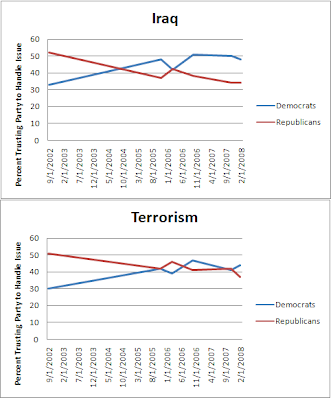Generally, citizens trust one party to handle some issues while they have more confidence in the other party on another set of issues. For example, over the last few decades, Republicans have been more trusted on issues involving taxes and national security while Democrats have fared better on domestic policy issues such as health care, social security, and education. However, as the figure below indicates, Republicans are no longer trusted more than Democrats on any of these issues. (This figure was based on a national ABC News/Washington Post survey conducted in early February.)

As the figure shows, Democrats are far more trusted by the public on issues such as the economy, the budget deficit, and health care. But Democrats also now have a narrow edge on issues Republicans have traditionally owned, including taxes, the conflict in Iraq, and even the campaign against terrorism.
The decreasing trust in the Republican Party (and increasing trust in Democrats) on Iraq and terrorism has been one of the most notable changes over the past six years. The figures below track the public's trust of the parties on these two issues since 2002. Note that at the beginning of the period, Republicans held about a 20% advantage over Democrats on these issues. However, in the course of just a few years, Democrats are now significantly more trusted on handling the situation in Iraq and slightly more trusted on handling terrorism.

Last week, the Bush and McCain went up against Obama on national security issues, something that Republicans have consistently used to their advantage over Democrats in the past. But the shifts I've outlined below suggest that these themes may not be as successful as they once were. The public no longer trusts Republicans substantially more than Democrats on these issues. On the other hand, Republicans have to choose from a bad lot when it comes to the issues they stress. After all, they no longer seem to have a definitive advantage on any issues. And, as the figure below shows, the other major issue in this campaign, the economy, strongly favors Democrats at an even greater rate than it did in 1992 when George H.W. Bush lost his bid for a second term.

Ultimately, the erosion of the Republican brand has been dramatic. In the current climate, there are no strong issue areas for Republican candidates (presidential or otherwise) to focus on. Rather, there are simply some issues that are not as bad as others. Currently, it appears as though terrorism may remain a target issue for Republicans if only because their brand isn't as weak on this issue as it is on most others now.


No comments:
Post a Comment